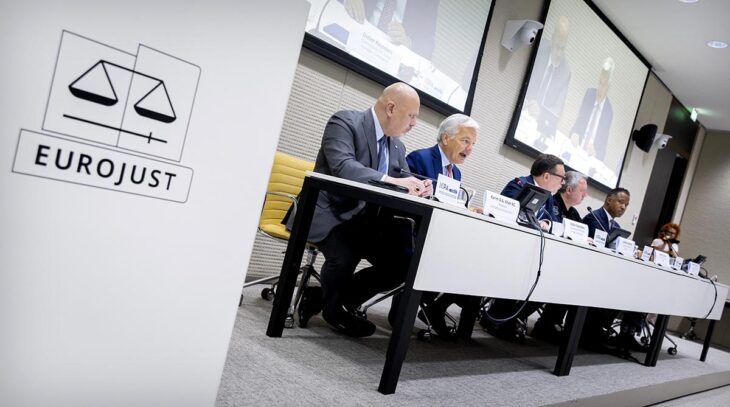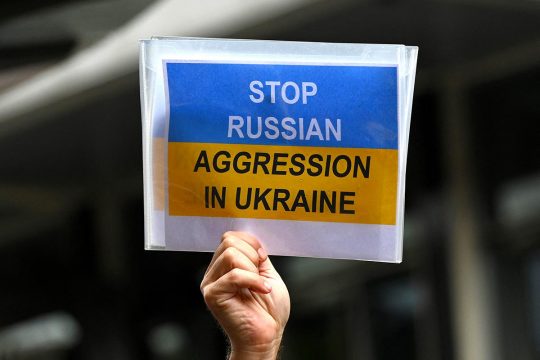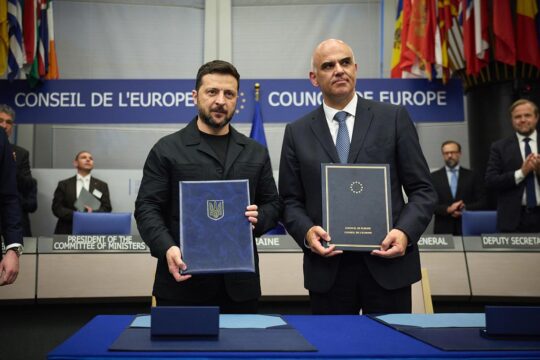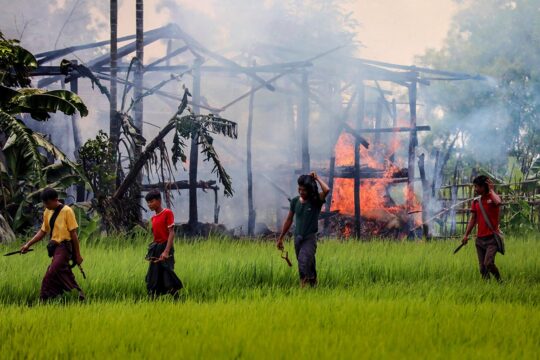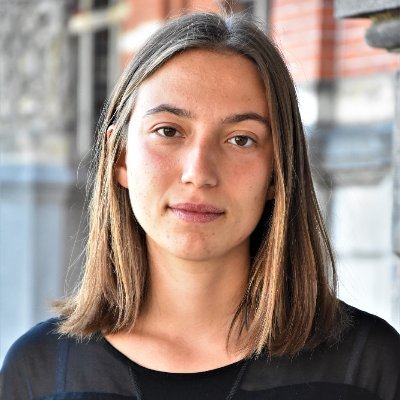On July 3, a new centre for gathering evidence on the Russian political and military leadership’s crimes linked to the invasion of Ukraine on February 24, 2022, has officially started its work in The Hague, The Netherlands. This is an “epoch-defining moment,” said Prosecutor General of Ukraine Andriy Kostin at the press conference for the launch of the International Centre for the Prosecution of the Crime of Aggression (ICPA).
This new institution is an unicum in international law. It is the first international effort to investigate the crime of aggression after the Second World War and it is operating as the war in Ukraine still wages. As a first step that could lead to a special tribunal prosecuting the crime of aggression, it is supposed to help fill a gap in international law. There is no international court that can currently investigate this crime in the context of the war in Ukraine, even though a key principle in the charter of the United Nations is to prohibit the unilateral invasion and annexation of another country. The Hague-based International Criminal Court (ICC) has had jurisdiction on the crime of aggression since 2018, but it cannot prosecute it when the states involved are not parties to the court. And Russia is not. Hence the push by Ukraine and some of its allies to have a new court created.
The new ICPA is hosted by Eurojust, the European Union Agency for Criminal Justice Cooperation. Besides Ukrainian justice officials, the centre is supported by the European Union, the United States, and the ICC. “The crime of aggression is mother to all war crimes,” said president of Eurojust Ladislav Hamran at the press conference. By investigating it they will address “a very important impunity gap,” he added.
Centralising and storing evidence
“This is a very positive step,” said Gaiane Nuridzhanian, associate professor at the National University of Kyiv-Mohyla Academy. “Coordination of efforts is very important in ensuring accountability for different international crimes that are being committed in Ukraine,” she added. “Holding accountable those who are responsible for starting and waging this war and those who committed atrocities during the war is very important for people in Ukraine,” said Nuridzhanian.
Ukrainian prosecutors have already started working at Eurojust, said Kostin in a tweet the day after the launch. Besides Eurojust current prosecutors it is expected that about 20 others would join from different countries, according to Hamran. The new centre will function as an investigative mechanism. It will centralise and store evidence in the database of Eurojust. The evidence will be analysed in order to find and fill possible gaps. National prosecutors in Latvia, Estonia, Lithuania, Poland and Ukraine, who are already working together in the Joint investigative Team for Ukraine, will be at the forefront of gathering probes. The ICC and the US have also committed to contributing information. Once a robust dossier is created, it would be ready to be sent to any national or future international court.
What kind of court?
Kostin said that Ukraine has already convicted 20 Russians in absentia for the crime of aggression, and 600 more were notified of suspicion. But at the national level limitations remain when going up the ranks of the political and military leadership. A country’s president, prime minister and minister of foreign affairs have personal immunity in national jurisdictions, explained Nuridzhanian.
Generally, national courts also have to face political issues. “It is a fairly widespread belief among states and the academic community that it is not a good idea for a country to be prosecuting another one for the act of aggression,” said Kevin Jon Heller, Professor at the University of Copenhagen, Centre for Military Studies. Ukraine, as the victim state, has “every moral right” and clear jurisdiction to prosecute aggression in its national courts, Heller said. But this can be “politically problematic” and have repercussions. For this reason, “aggression is really the kind of crime that needs to be prosecuted in some international forum whether international or internationalized,” he said.
These two options have divided the international community since the debate started in February 2022. Ukraine wants an international tribunal supported by the United Nations and its Generally Assembly, as Kostin made clear at the press conference. “The crime of aggression committed by Russia against Ukraine is the crime against global peace and security and to fill in the gap in international law we need an international response,” he said. But to do that he needs broad international support.
Instead, the United States and the G7 countries (Canada, France, Germany, Italy, Japan, the United Kingdom and the US) seem to favour an internationalised tribunal. On July 3 in The Hague, US Assistant Attorney General Kenneth Polite expressed his country’s support for an “international tribunal rooted in Ukrainian law but that includes concepts of international law”. European Commissioner for Justice Didier Reynders said that the discussion on it will continue among countries of the G7.
The cooperation of the ICC
“I think the writing is on the wall that if there is going to be any kind of tribunal it will be an internationalized one,” Heller believes. A fully international court is not getting the support of many states, which consider it “cumbersome, expensive, and time consuming,” said Heller, adding that some also asked why there would be a tribunal for Ukraine and not for other victims of acts of aggression.
“In the future, the ICC should have the jurisdiction over the crime of aggression,” said Nuridzhanian. But at the moment “the situation in Ukraine put into spotlight the deficiencies of the ICC jurisdiction when it comes to this crime”. For the ICC to be able to prosecute the crime of aggression in this case it would require amending the statute of the court. Reynders expressed his hope that such amendment be made. “The natural home for the crime of aggression is the Rome statute,” echoed the ICC Prosecutor Karim Khan, who said that some states already seemed willing to table some amendments. But changing the ICC statute is a political hard sell and will take time and tough negotiations. In the meanwhile, the ICC said it will therefore cooperate with the new ICPA.
Hamran pointed the focus back onto the centre’s work. “We have a huge amount of evidence which is available in different jurisdictions,” he said. He mentioned videos, aerial photography, intercepted communication, mobile phones’ data, and so on. “Never in history we’ve had more evidence about the aggression.” And it requires “a huge effort” to collect and analyse all this material.
Proving criminal responsibility
“Another big challenge ahead,” said Hamran, is making sure all evidence is admissible and all elements of the crime are properly documented. There are, in fact, two components to this crime, explained Heller. First, you have to find a state act of aggression “and that is easy because this was a completely unprovoked invasion involving hundreds of thousands of troops,” he said. Second, you have to find evidence to show who is criminally responsible for these acts. That means showing that the person was in a leadership position and could directly control the military or political decisions of the state. And then you have to find that a group of individuals “in fact participated in the planning, preparation, initiation or waging of the act of aggression”, Heller said. “Those are the murkier parts.”
It will not be easy to build aggression cases for a large number of people, Heller stressed. Evidence might be easy to find for Russian President Vladimir Putin, Prime Minister Michail Mišustin, Foreign Minister Sergej Lavrov, and the highest ranking generals. But for many others “getting the evidence to prove individual responsibility is more difficult mostly because there is no evidence outside of Russia,” said Heller. “All the evidence for aggression is locked in filing cabinets and archives inside of Moscow.”


